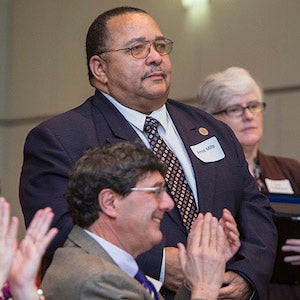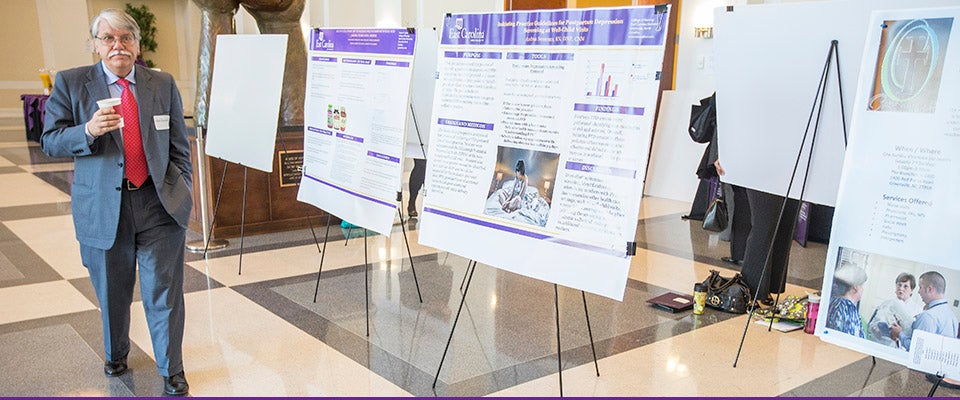GENERATING SOLUTIONS
Symposium peddles patient-centered partnerships
Innovative community health care driven by patient needs, and tailoring local resources to cooperatively address those needs was the focus of the 11th annual Jean Mills Health Symposium held Feb. 6 at East Carolina University.
“North Carolina’s strength in health care comes from putting the needs of patients and community first,” said Dr. L. Allen Dobson, keynote speaker and current president and CEO of Community Care of North Carolina, the comprehensive network that manages health care delivery for the state’s Medicaid recipients and low-income insured residents.
Dobson told the audience – an assortment of health care providers, community and faith leaders, faculty, students and community residents – that eastern North Carolina has pioneered a successful model of collaborative efforts that put patient needs before health care industry needs.
He outlined a “state of the union” for the current health care system, noting the high costs of providing care and the lack of sustainability. As a result of these conditions, Dobson said, patients are absorbing more of the costs, insurers are narrowing their networks and providers are being consolidated – actions that aren’t adequately addressing the issues at hand.
Dobson highlighted consolidation in particular, noting how unsuccessful the shift from physician-owned practices to health-system-owned practices can be.
“Consolidation, practice purchasing and this type of activity is actually driving up costs,” he said.
The higher costs associated with ownership consolidation often result from more care being delivered in high-cost hospital settings and hospital based ambulatory surgical centers, Dobson explained. While he noted that increased coordination of care and less duplication of tests and treatments help decrease costs for consolidated practices, he said physician-owned practices provide lower cost care.
He cited a report from the Journal of the American Medical Association showing that care at a physician-owned practice costs $743 less per patient per year than care at a health-system owned establishment. Dobson went on to say that larger practices tend to prevent fewer hospital admissions and re-admissions and often focus on “sick care” more than preventative medicine.

Amos T. Mills III, pictured above, was recognized at the ceremony. He created the event in honor of his sister, an ECU alumna.
North Carolina’s effectiveness in addressing such issues lies with the state’s collaborative efforts across disciplines and a knack for tailoring approaches to local resources, according to Dobson. Through these efforts Community Care ensures health care is focused at the community level and ensures patients’ needs are met, no matter their location, he said.
“Health care, just like politics, is local. You can’t take something that worked in Durham or Charlotte and make it work in little Washington,” he said.
The daylong symposium also featured panels and breakout sessions on ways community partnerships can address issues around obesity, diabetes and mental health, especially in minority populations.
The Mills Symposium was created by Amos T. Mills III in memory of his sister, an ECU alumna with a passion for community health and health equity. Presented by the College of Allied Health Sciences in collaboration with the ECU Medical & Health Sciences Foundation, the annual event is aimed at generating awareness and solutions for health problems that plague North Carolinians and minorities in particular.
-by Lauren Edmondson
